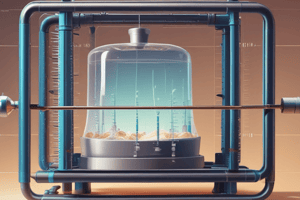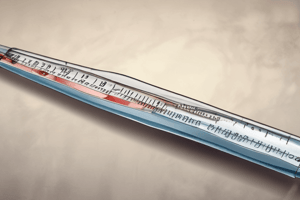Podcast
Questions and Answers
What is the unique property of the resistor used in a bridge circuit for temperature measurement?
What is the unique property of the resistor used in a bridge circuit for temperature measurement?
- It produces a voltage dependent on temperature difference
- It is used to measure the breathing rate of patients
- Its resistance changes rapidly with heat (5%/°C) (correct)
- It is used in medical applications only
What is the purpose of keeping one of the junctions of a thermocouple at a reference temperature?
What is the purpose of keeping one of the junctions of a thermocouple at a reference temperature?
- To increase the voltage produced by the thermocouple
- To eliminate the effect of external physical factors
- To provide a fixed reference point for temperature measurement (correct)
- To reduce the voltage produced by the thermocouple
What is the primary application of thermistors in medicine?
What is the primary application of thermistors in medicine?
- Measuring the body's surface temperature
- Measuring the temperature of individual cells
- Monitoring the breathing rate of patients (correct)
- Diagnosing diseases through thermography
What is the range of temperature measurement possible with a copper-constantan thermocouple?
What is the range of temperature measurement possible with a copper-constantan thermocouple?
What type of radiation is emitted by the human body?
What type of radiation is emitted by the human body?
What is the purpose of thermography in medical diagnosis?
What is the purpose of thermography in medical diagnosis?
What is the advantage of using thermistors for temperature measurement?
What is the advantage of using thermistors for temperature measurement?
What type of heating is produced when charged particles in the tissue are attracted to one plate and then the other, depending on the sign of the alternating voltage?
What type of heating is produced when charged particles in the tissue are attracted to one plate and then the other, depending on the sign of the alternating voltage?
What is the common application of thermocouples in medicine?
What is the common application of thermocouples in medicine?
What is the frequency of microwave diathermy used in therapy?
What is the frequency of microwave diathermy used in therapy?
What is the purpose of the coil in short wave diathermy method B?
What is the purpose of the coil in short wave diathermy method B?
What is the main difference between ultrasonic waves and electromagnetic waves?
What is the main difference between ultrasonic waves and electromagnetic waves?
What is the advantage of using short wave diathermy in joints with minimal soft tissue coverage?
What is the advantage of using short wave diathermy in joints with minimal soft tissue coverage?
What is the device used to produce microwave diathermy?
What is the device used to produce microwave diathermy?
What type of diathermy is used in fractures, sprains, and strains?
What type of diathermy is used in fractures, sprains, and strains?
What is the power of ultrasonic waves used in therapy?
What is the power of ultrasonic waves used in therapy?
What is the formula to convert Celsius to Fahrenheit?
What is the formula to convert Celsius to Fahrenheit?
What is the purpose of the restriction above the bulb in a fever thermometer?
What is the purpose of the restriction above the bulb in a fever thermometer?
What is the typical diameter of the capillary in a fever thermometer?
What is the typical diameter of the capillary in a fever thermometer?
What is the purpose of the convex front glass tube in a fever thermometer?
What is the purpose of the convex front glass tube in a fever thermometer?
Why are room thermometers not used in medicine?
Why are room thermometers not used in medicine?
What is the composition of a thermistor?
What is the composition of a thermistor?
What is the percentage expansion of mercury in a glass-liquid thermometer from 0-100°C?
What is the percentage expansion of mercury in a glass-liquid thermometer from 0-100°C?
What is the typical location where the temperature is taken using a fever thermometer?
What is the typical location where the temperature is taken using a fever thermometer?
What is the minimum temperature required for long-term preservation of blood and tissues?
What is the minimum temperature required for long-term preservation of blood and tissues?
What is the percentage of red blood cells that hemolyze each day when stored at 4°C?
What is the percentage of red blood cells that hemolyze each day when stored at 4°C?
Why is liquid nitrogen better for preservation than solid carbon dioxide?
Why is liquid nitrogen better for preservation than solid carbon dioxide?
What is the purpose of adding glycerol to the blood during freezing?
What is the purpose of adding glycerol to the blood during freezing?
What is the consequence of not freezing the blood rapidly enough?
What is the consequence of not freezing the blood rapidly enough?
What is the advantage of using liquid nitrogen for freezing blood?
What is the advantage of using liquid nitrogen for freezing blood?
What is the problem with using protective agents like glycerol in blood preservation?
What is the problem with using protective agents like glycerol in blood preservation?
What is the method of freezing blood by dropping it onto the surface of liquid nitrogen?
What is the method of freezing blood by dropping it onto the surface of liquid nitrogen?
What is the main purpose of immersing the container with blood into a liquid nitrogen bath?
What is the main purpose of immersing the container with blood into a liquid nitrogen bath?
What is the primary challenge in preserving large tissue like bone and muscles?
What is the primary challenge in preserving large tissue like bone and muscles?
What is the benefit of using cryosurgery in the treatment of Parkinson's disease?
What is the benefit of using cryosurgery in the treatment of Parkinson's disease?
What is the purpose of temporarily freezing the area of the thalamus during cryosurgery for Parkinson's disease?
What is the purpose of temporarily freezing the area of the thalamus during cryosurgery for Parkinson's disease?
What is the typical outcome of the destroyed tissue after cryosurgery for Parkinson's disease?
What is the typical outcome of the destroyed tissue after cryosurgery for Parkinson's disease?
What is the significance of the temperature of -10°C in cryosurgery for Parkinson's disease?
What is the significance of the temperature of -10°C in cryosurgery for Parkinson's disease?
What is the advantage of using cryosurgery in the treatment of Parkinson's disease over other methods?
What is the advantage of using cryosurgery in the treatment of Parkinson's disease over other methods?
What is the percentage of successful outcomes reported in the treatment of Parkinson's disease using cryosurgery?
What is the percentage of successful outcomes reported in the treatment of Parkinson's disease using cryosurgery?
Flashcards are hidden until you start studying
Study Notes
Temperature Measurement and Thermometers
- To convert °C to °F, use °F = °C (9/5) + 32 or °C = (°F - 32) 5/9
- °C = °K - 273 or °K = °C + 273
Types of Thermometers
- Glass-Liquid Thermometer
- Composed of a glass capillary tube with a bulb that stores liquid (mercury or alcohol for low-temperature measurement)
- When heated, the liquid inside expands more than the glass, causing it to rise in the capillary
- Mercury expands 1.8% from 0-100°C
- Has a thin capillary (less than 0.1mm in diameter) to make the mercury rise higher per degree
- Has a restriction above the bulb to prevent the mercury from returning unless the thermometer is moved rapidly with a proper snap of the wrist
- Used for fever measurement, with temperature usually taken underneath the tongue or in the rectum
- Thermistor
- Composed of a bridge of four resistances with a source of electricity
- One of the resistors is used for temperature measurement (resistor T)
- Resistor T changes rapidly with heat (5%/°C)
- Used in medicine due to its high sensitivity, allowing for measurements of temperature changes as small as 0.01°C
- Placed in the nose to monitor breathing rate by showing temperature changes between inspired cool air and expired warm air (pneumograph)
- Thermocouple
- Consists of two junctions of two different metals
- If the two junctions are at different temperatures, a voltage is produced that depends on the temperature difference
- Usually, one of the junctions is kept at a reference temperature, such as in an ice-water bath
- The copper-constantan thermocouple can be used to measure temperatures from -190 to 300°C
- Can be made small enough to measure the temperature of individual cells
Thermograph - Mapping the Body's Temperature
- The surface temperature of the body is slightly different in different parts, depending on external physical factors and internal metabolic and blood supply to the skin
- Measurement of surface temperature is useful in diagnosis of some diseases that change locally the skin temperature
- All objects emit heat radiation, including the body, which emits infrared radiation (IR) of long waves
- Different methods are used to transfer electromagnetic energy into the body, including:
- Placing the part of the body to be treated between two plates (electrodes) connected with a high-frequency power supply
- Transferring short-wave energy into the body by magnetic induction
- Using microwave diathermy, which can penetrate deeper into tissue and cause more uniform heating around bony regions
Cryogenic Methods
- Cryosurgery
- Uses cryogenic methods to destroy cells
- Has several advantages, including minimal bleeding, controlled tissue destruction, little pain, and short recovery
- One of the first uses of cryosurgery is in the treatment of Parkinson's disease, by destroying parts of the thalamus that control nerve impulses to the rest of the nervous system
- The instrument used is shown in book fig. 4.14, and the treatment is done while the patient is conscious
- Preservation of Tissues and Organs
- Low temperatures can be used to preserve tissues and organs for longer periods of time
- Liquid nitrogen (-196°C) is used for long-term preservation, as it reduces the rates of biochemical and physical processes that sustain life
- Blood can be preserved for very long periods of time if frozen rapidly in liquid nitrogen (-196°C), with the addition of protective agents such as glycerol
- Cornea and skin have also been successfully preserved using cryogenic methods
Studying That Suits You
Use AI to generate personalized quizzes and flashcards to suit your learning preferences.




